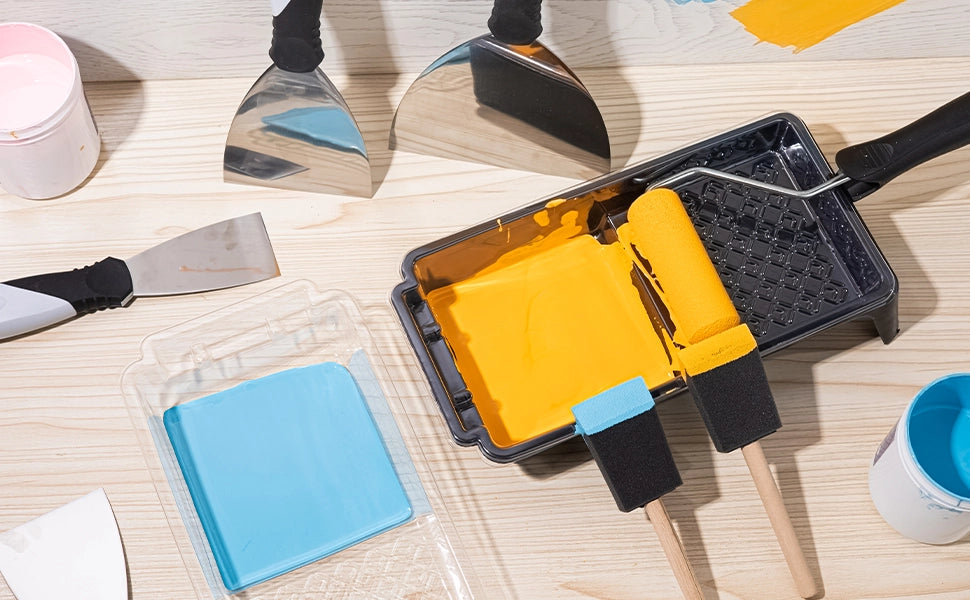Painter’s tape isn’t just for straight lines anymore. While 73% of DIYers use it to protect trim, most miss its true potential. From creating museum-worthy geometric walls to saving hours on intricate projects, here’s how to wield that blue (or green) tape like a $100/hr painting contractor.
1. The Double-Tape Trick for Razor-Sharp Edges
Pros know single-layer taping often lets paint bleed through wood grain. For ultra-clean lines:
- Apply FrogTape Multi-Surface (with patented PaintBlock® tech) parallel to the edge
- Overlap with a second strip 1/8” away
- Paint the gap first to seal the edge before coating the main surface
This creates a capillary action barrier that stops 99% of bleed-through, even on popcorn ceilings.
2. Reverse Stenciling for Complex Patterns
Turn basic tape into custom stencils:
- Use a craft knife to cut shapes from tape stuck to wax paper
- Burnish edges with a credit card
- Spray over the tape with Rust-Oleum Metallic Finish
- Peel immediately for crisp negative-space designs
Works great for Moroccan tiles or galaxy-themed kids’ rooms.
3. Texture Surface Mastery
Most tapes fail on brick or shiplap. Try this:
- Warm the tape with a hairdryer to improve adhesion
- Press into crevices using a rubber grout float
- Dab acrylic caulk along edges with a wet finger
- Peel at a 45° angle within 1 hour to prevent residue
4. The 20-Minute Fade Technique
Create ombré walls without special tools:
- Paint the base color and let dry
- Tape horizontal lines every 12”
- Mix 4 progressively lighter paint batches
- Remove one tape strip every 20 minutes while painting
The slight overlap creates seamless gradient transitions.
5. Multi-Color Precision for Accent Walls
Nail those perfect hexagons or chevrons:
- Snap laser-leveled guidelines
- Apply tape outside the design area
- Use 3M ScotchBlue™ Edge-Lock for curves
- Paint lightest color first, working to darkest
- Seal edges with clear glaze between coats
6. Hardware Protection Protocol
Don’t waste time removing outlet covers:
- Wrap switches/outlets in plastic wrap
- Secure with X-shaped tape crosses
- Cut clean access holes with a hook blade
- Peel tape downward to avoid snagging wires
7. Weatherproof Outdoor Projects
Make tape survive rain/stain spraying:
- Apply Nashua 324A All-Weather Tape at 70°F+
- Seal edges with clear urethane
- Remove within 24 hours before UV hardening
- Use denatured alcohol on stubborn residue
8. The 2-Hour Rule for Perfect Removal
Wait times matter:
- Latex paint: Remove tape at 70°F when paint is dry to touch (1-2 hrs)
- Oil-based: Wait 4-6 hours but before full cure
- For multi-day projects: Re-tape daily to avoid adhesive bonding
9. Fixing Tape Failures Mid-Project
If paint bleeds through:
- Let dry completely
- Apply new tape 1/16” inside the flawed edge
- Use an artist’s brush to “cut in” correction lines
- Feather with a dry sponge
10. Beyond Walls: 3 Unusual Uses
- Furniture Makeovers: Tape + chalk paint = perfect farmhouse distressing
- Concrete Stenciling: Pair with acid stains for patio patterns
- Glass Etching: Create leaded window effects with tape and etching cream
Pro Tip: Store tape vertically in a Ziploc bag with silica gel packs – extends shelf life by 18 months.



0 comments